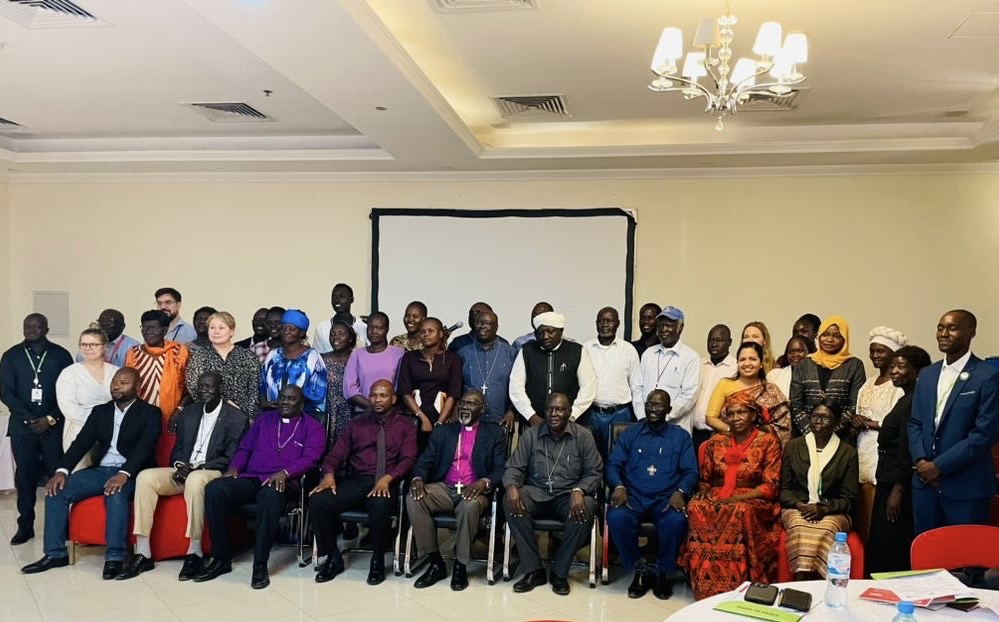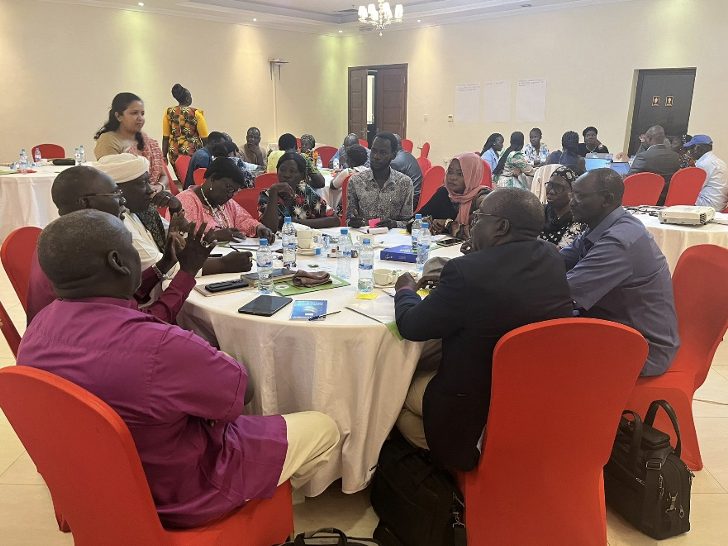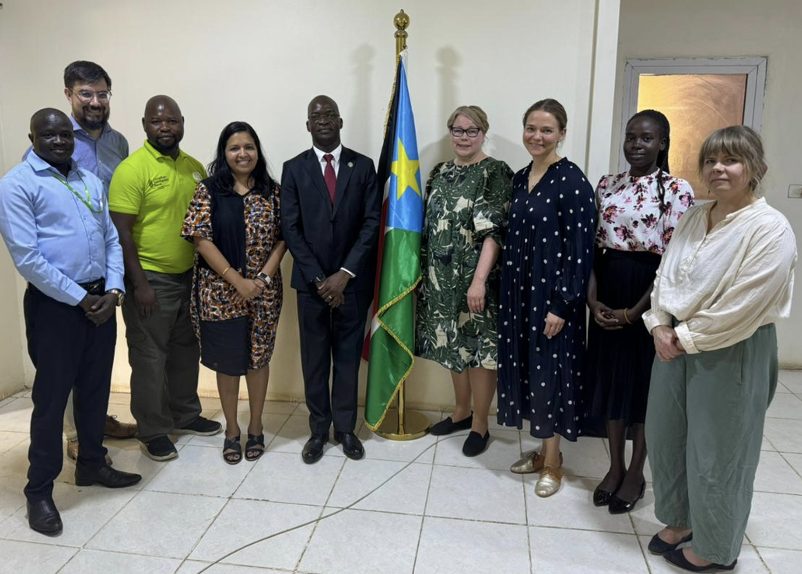The Role of Religious Actors in Ensuring Fair, Safe and Transparent Elections in South Sudan
Event | March 2024
In preparation for South Sudan’s first general elections scheduled for December 2024, South Sudan Council of Churches (SSCC), Finn Church Aid (FCA), and the Peacemakers Network convened a consultative workshop exploring the role of religious actors in peacebuilding with a particular focus on ensuring peaceful elections.

Participants at the consultative workshop convened by the South Sudan Council of Churches, Finn Church Aid, and the Peacemakers Network.
A Pathway to General Elections
In renewed efforts by the government and civil society, South Sudan is preparing for its first general election since its independence in 2011. If it proceeds as planned, the December 2024 election marks a significant moment in the country’s transitional period, following the September 2018 revitalized peace agreement that brought an end to its seven-year civil war. Similar to the 2009 referendum which marked the culmination of the Comprehensive Peace Agreement (CPA), the 2024 elections is also considered as the culmination of the Revitalized Agreement on the Resolution of Conflict in South Sudan (R-ARCSS). However, despite initial preparations, there are several challenges ahead including security risks, militarized political factions, unmet milestones in the revitalized agreement, weak election monitoring systems and lack of resources, all of which raise concern for the prospects of a safe, fair, and transparent election.
In recognizing that a ‘whole-of-society’ approach an imperative mechanism to ensure credibility and peace in the upcoming election, FCA and the Peacemakers Network, together with SSCC hosted a two-day consultative workshop with religious actors in Juba. This consultation enlisted religious actors in identifying opportunities, challenges, and gaps for increasing their role in supporting safe, inclusive, and peaceful elections in South Sudan.
The Influence of Religious Actors in South Sudan
Religious actors are highly respected and wield considerable influence within South Sudan. Over the years, the churches in South Sudan have had an influential role in resolving conflicts, reconciling parties, and building trust and confidence between communities. Further, the SSCC has facilitated advocacy from the grassroots and national to the international level that contributed to the current peace processes. These included diaspora engagement activities, facilitation of Track II diplomatic negotiations, and public outreach to promote a peaceful resolution to the conflicts. In the past, the churches mobilized extensive advocacy to ‘stop the bombing’, for ‘right to self-determination’, and to ‘stop the war’ leading up to independence.
Further, churches have opened their doors as conveners for local peace conferences, such as the recent “Our Ambition for a Peaceful Community” conference bringing together more than 500 participants. Hosted by the United Nations Multi-Partner Trust Fund for Reconciliation, Stabilization, and Resilience in South Sudan (RSRTF) consortium led by the International Organization for Migration (IOM) and partners including FCA, this conference provided a platform for constructive dialogue, reflection, and collaboration towards sustainable peace and reconciliation in Kajo-Keji.
“Religious and traditional leaders play an important role in election preparedness, monitoring of election processes, and facilitating a peaceful transition after the elections due to their proximity to communities, the trust and respect that they command from the people, as well as their perceived independence and impartiality in matters of governance. Religious and traditional leaders provide moral guidance, civic and voter education, advocate for social justice including broadening civic space and equitable representation and promote messages of peace and reconciliation.”
Gina Dias, Africa Regional Programme Manager, Peacemakers Network
A Shared Vision for Peaceful Elections
Over the two days, diverse stakeholders including youth, women leaders, religious and traditional leaders and representatives from minority communities explored mechanisms to collaboratively and proactively reach the communities and engage multiple stakeholders especially the government in processes before, during, and after the elections in South Sudan.
Emphasizing the importance of unified messaging, participants recognized the moral authority and legitimacy of religious actors and their ability to educate the public about the candidates, emphasize the importance of safe voting , and provide guidance on how to do so.

Participants at the two day consultative workshop on election support.
Participants reiterated how the 2024 election, if it happens, provides an opportunity for the religious leaders to utilize their influence to support peace and reconciliation throughout the country in led-up to, during and after the elections. With the credibility of religious actors being often unparalleled to government officials, they can serve as election monitors and even encourage polling stations to be in houses of worship to provide a trusted space for voters.
FCA has a long and close relationship with the SSCC, which is a key player in peacebuilding in the country. FCA supports networks, advocacy, trainings, and discussions for youth and women as well as peer to peer discussions. The Finnish Foreign Ministry, meanwhile, supports a meeting space for young people with digital access at the SSCC.
“Religious leaders and churches play the key role in peace dialogues that have had real impact on reconciliation efforts and preventing violence on the ground. FCA is well positioned in this work with exceptional connections to both churches and the Ministry of Peacebuilding.”
Tapio Laakso, Head of Advocacy, Finn Church Aid

FCA & Peacemakers Network members meet with Ministry of Peacebuilding in South Sudan.
During a meeting with Ministry of Peacebuilding Undersecretary, Hon. Pia Philip expressed his appreciation for the partnership and support by FCA to the Ministry and in facilitating peace conferences. He also expressed his gratitude for the monthly peacebuilding coordination forum meetings in which FCA supports with Secretariat services with key stakeholders in the country.
As South Sudan prepares to embark on a new chapter in its democratic journey, the proactive engagement of religious and traditional actors serves as a step to navigate the contextual complexities and foster a society of inclusive positive peace.
FCA and Peacemakers Network’s Continued Engagement in South Sudan
FCA and the Peacemakers Network continues to support youth, women, and religious and traditional leaders in mediating conflicts, building peace, and social cohesion across South Sudan. As the country prepares to embark on a new chapter in its democratic journey, the proactive engagement of religious and traditional actors serves as a step to navigate the contextual complexities and foster a society of inclusive positive peace.
Follow the Peacemakers Network on social
